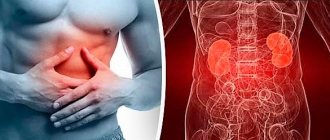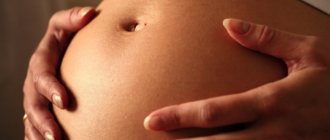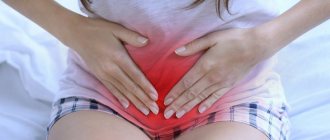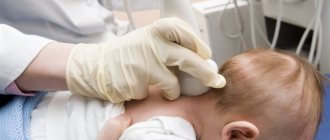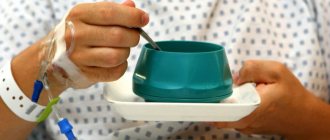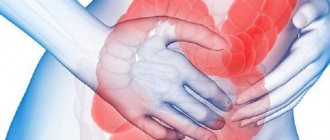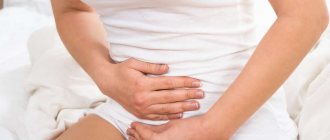It is difficult to find a woman who is unfamiliar with pain before menstruation. As a rule, such a state is taken for granted. This is partly true. The body experiences hormonal surges, blood rushes to the internal organs, and all this does not happen without unpleasant sensations. But sometimes it’s difficult to figure out what exactly hurts before menstruation: the stomach, intestines, ovaries, rectum or something else. If the pain is synchronized with menstruation, that is, it goes away regularly after it ends, then most likely its cause is completely natural. If unpleasant sensations continue to haunt a woman, then perhaps we are talking about pathological changes. Be that as it may, it is difficult to understand what is happening on your own. You will need to consult a gynecologist, gastroenterologist and proctologist.
Can your stomach hurt these days?
At a basic level, menstruation occurs due to fluctuations in hormone levels that cause the uterus to shed excess lining. But why then does your stomach hurt during menstruation? After all, it is a completely different part of the body.
It turns out that it's completely normal to struggle with stomach pain during your period. Digestive problems during menstruation are indeed common.
Those of us with underlying gastrointestinal issues may be more susceptible to digestive problems during menstruation. Women with irritable bowel syndrome are more likely to experience stomach discomfort during their periods than those who do not have GI distress. Understanding this fact will ease concerns that a woman is experiencing something abnormal.
How to distinguish a disease from the norm
Speaking about the difference between disease and pathology, it is useful to provide a table that indicates other common causes of both natural and painful conditions.
| Natural causes | Manifestations of the disease |
| Lack of progesterone | Intestinal infection syndrome |
| Elevated prostaglandin levels | Benign formations |
| Hormonal contraceptives | Colon disease |
| Endometrial rejection | Microflora disturbance |
| Side effects from taking medications | Blockage of the arteries that supply food to the intestines. |
Only after a series of analyzes and studies can we talk about the cause of the problem.
It often happens that during menstruation, pain in the intestines is caused by psychosomatic disorders.
An increase in temperature is a very alarming symptom
The surest signs of a pathological condition are the following changes:
- the temperature rises greatly;
- intoxication of the whole body;
- the person feels constant fatigue and weakness.
Such symptoms will not go away after the cessation of menstruation, and in the absence of medical help they will even intensify.
So who is the culprit of the pain?
It turns out that the chemicals and hormones that trigger our periods are probably also responsible for our stomach problems. But it is important to understand that there is not much research in this area. The cause is thought to be prostaglandins, chemicals that allow the uterus to contract.
Prostaglandins can cause stomach tenderness associated with dysmenorrhea, the medical term for painful menstrual periods.
Prostaglandin-induced cramping and bowel upset usually occur in the first three days of the menstrual cycle. It happens that your stomach hurts a week before your period starts. In this case, stomach colic may be part of a group of symptoms called premenstrual syndrome (PMS).
Pain before menstruation
Pain in the uterus of varying intensity before menstruation occurs in all women. This is due to the physiology of the female body. The menstrual cycle involves preparing the body for conception and subsequent gestation. If after the release of the egg it is not fertilized, then processes occur that lead to rejection of the endometrium of the uterus. During this period, menstruation begins. The tone of the uterus increases and contractions occur. They are what women perceive as pain before menstruation. If they occur 1-3 days before the start and in the first few days of menstruation, this is the norm.
But if you have nagging pain in the lower abdomen a week before your period, you should consult a gynecologist. Their causes can be both harmless processes and serious pathology. These include adhesions of the organs of the reproductive system, damage to the digestive tract, menstrual irregularities, chronic inflammatory processes of the genital organs, late ovulation, and pregnancy.
Don't forget about PMS (premenstrual syndrome), which is one of the common causes of pain before menstruation. Its formation can be associated with various symptoms - nausea, vomiting, headaches, sweating, swelling, weakness, emotional disturbances. Depending on the prevailing symptoms, edematous, neuropsychic, cephalgic and crisis forms of PMS are distinguished.
Why do hormones affect the stomach?
Estrogen and progesterone are two hormones that regulate your menstrual cycle. Prostaglandins are a lipid or fat, a compound that actually acts as a hormone. There are different types of prostaglandins, one of them is specific to the female reproductive system. Like estrogen and progesterone, prostaglandin levels also fluctuate throughout the menstrual cycle.
It is not known exactly why the intestines hurt before menstruation and how this is related to hormonal changes throughout the cycle. However, it is known that sex hormone receptors are located along the gastrointestinal tract. Receptors interact with hormones and regulate certain physical responses.
Fluctuations in estrogen, progesterone, and prostaglandins during the menstrual cycle also cause changes in the muscles of the gastrointestinal tract that control digestion.
The presence of sex hormone receptors in the gastrointestinal tract causes pain in the stomach, intestines and digestive problems during menstruation.
- Progesterone is well known to cause constipation during pregnancy by slowing the movement or contraction of muscles in the gastrointestinal tract.
- On the other hand, estrogen tends to increase gastrointestinal motility and may cause diarrhea.
Prostaglandins, specific to the female reproductive system, play a role in the contraction of the uterine muscles, which can cause pelvic cramps. Because there are also sex hormone receptors along the gastrointestinal tract, as in the uterus, prostaglandins can potentially act on muscles in the gastrointestinal system. This may be why your stomach hurts before your period and you experience bloating.
Causes
The development of pain in the uterus or cervix before menstruation occurs for many reasons. These include physiological and pathological. Hormonal disruptions in a woman’s body can occur against the background of psycho-emotional lability, which leads to a decrease in the threshold of pain sensitivity. A decrease in the production of enkephalins and endorphins leads to a woman's greater perception of pain. Prostaglandins play an important role. An increase in their production entails a spastic contraction of the uterine muscles. They also affect the walls of blood vessels, causing them to narrow.
If the uterus hurts during menstruation, leading to a disruption in the woman’s general well-being, this indicates the presence of a pathology of the genitourinary system. They can occur with endometriosis, inflammation of the genital organs, uterine fibroids, or installation of an IUD. Malformations (bicornuate, double uterus) lead to stagnation of menstrual blood in the uterine cavity. Blood mechanically irritates the nerve endings, which causes pain.
Ways to feel better
To begin with, women whose stomachs go out of order and intestines hurt before menstruation are recommended to keep a diary. There, record and track symptoms, diet, and physical activity to determine if certain triggers, such as food type, are worsening your digestive health. Then try to eliminate or avoid these triggers before and during your period.
- It is important to remember to drink water and increase the amount of fiber in your diet to help solidify loose stools.
- If constipation bothers you, eat more vegetables and dairy products.
- Try to eat foods that contain active cultures of beneficial bacteria (probiotics), like those found in yogurt.
- You can control and prevent some premenstrual symptoms and stomach pain by taking nonsteroidal anti-inflammatory drugs (NSAIDs) such as ibuprofen or naproxen. They are needed to suppress the release of chemicals associated with pain.
- Taking birth control pills to prevent ovulation also helps prevent many painful symptoms.
- Believe it or not, exercise is the best medicine to treat PMS and all kinds of pain. Calm exercise will ease cramps by improving blood flow.
- Also, avoid caffeine and junk food, as both can cause painful cramps in the stomach and intestines.
Remember that a healthy diet and regular exercise can keep your stomach and bowels happy, especially during your period.
However, if you experience significant pain or have bloody stools, there may be more to the cause than just PMS symptoms. Endometriosis, a chronic disease affecting the reproductive system, can (although rarely) affect the intestines, causing bloody stools.
How to alleviate the condition?
If diarrhea is not caused by gynecological diseases, then exclude the following foods from your diet before menstruation:
- Kefir;
- Dried apricots;
- Beetroot;
- Plum;
- Vegetable juices;
- Cucumbers.
On critical days, try to monitor your appetite, eat less and in small portions. It is best to avoid causing diarrhea and eat only freshly prepared foods. Drink more purified boiled water, but do not exceed its consumption (the norm is 2 liters per day).
If diarrhea causes you severe discomfort, try simple foods that strengthen you: buckwheat porridge, strong black tea, meat broth, oatmeal, boiled rice, cottage cheese and crackers.
The use of medications to combat intestinal disorders is strongly discouraged. Do not use Imodium or other antidiarrheals. They can cause constipation, and as a result, flatulence and cramping pain. For severe pain, you can use antispasmodics, for example, “No-shpa”, “Spazmalgon” and others. They will eliminate pain and relieve spasms in the intestines and uterus. However, their frequent use can cause bleeding.
If you have a lot of pain in your lower abdomen and you often feel the urge to have a bowel movement, an infusion of valerian or peony will be a harmless and effective remedy for you, which will not only relax the nervous system, but also the body. During menstruation, other herbal infusions are not as effective as peony or valerian.
Usually 2-3 days after the start of menstruation, diarrhea and other symptoms disappear, and the body begins to function as usual. But, if during this time the intestinal disorder does not go away, you should sound the alarm.
To get rid of unpleasant syndromes, try to sleep more, reduce mental and physical stress, and spend more time in the fresh air.
What to do
If the pain is caused by inflammatory diseases or tumor processes, self-medication will worsen the situation. In the absence of diseases of the pelvic organs, you can use the following tips:
- take painkillers. You can take medications such as No-shpa or Ketorol;
- when the pain during menstruation is very strong, doctors recommend giving up physical activity and try to take a comfortable position;
- take a warm shower or place a warm, but not hot, heating pad on your lower abdomen;
- massage the uterine area. To do this, perform circular movements, being careful not to press your stomach too hard.
Pain in the lower abdomen during menstruation may indicate pathologies affecting both the uterus and abdominal organs. To determine the root cause of discomfort and prescribe effective therapy, it is important to undergo a comprehensive examination and undergo a series of tests.
Pain after menstruation
There is no need to worry if pain in the uterus persists for several days after your period. Slow restoration of hormonal levels leads to their preservation. These phenomena occur especially often in women after 40 years of age. They are associated with excess levels of female sex hormones (estrogens) in the blood or increased release of prostaglandins by the uterus. But if the pain persists for a week or its intensity is high, it is recommended to consult a doctor. Their persistence may indicate a relapse or the occurrence of damage to the reproductive organs.
Pain in the uterus that occurs a few weeks after menstrual bleeding may be associated with ovulation. The release of an egg from the ovary results in a slight defect in its wall, causing minor bleeding. The blood irritates the nerve endings of the peritoneum, so the woman experiences pain in the lower abdomen. Since the maturation of the egg occurs in one of the ovaries, the pain syndrome is felt more on the right or left. It is not intense and does not last long, which does not lead to disruption of the woman’s ability to work.
Intestinal pain before menstruation: normal or pathological?
It is difficult to find a woman who is unfamiliar with pain before menstruation. As a rule, such a state is taken for granted. This is partly true. The body experiences hormonal surges, blood rushes to the internal organs, and all this does not happen without unpleasant sensations. But sometimes it’s difficult to figure out what exactly hurts before menstruation: the stomach, intestines, ovaries, rectum or something else. If the pain is synchronized with menstruation, that is, it goes away regularly after it ends, then most likely its cause is completely natural. If unpleasant sensations continue to haunt a woman, then perhaps we are talking about pathological changes. Be that as it may, it is difficult to understand what is happening on your own. You will need to consult a gynecologist, gastroenterologist and proctologist.
How to eliminate intestinal pain and prevent it
It is extremely difficult to deal with pain without knowing its cause. When the intestines hurt during menstruation, it is advisable to apply a certain set of measures that reduce the pain syndrome or even completely eliminate it.
For example, you can use infusions or decoctions from:
- horsetail;
- chamomile;
You can brew chamomile tea, it is useful for gastrointestinal diseases
- bear ears;
- mint;
- viburnum bark;
- raspberries (both berries and leaves).
In the pharmacy you can find herbal remedies or other medicines based on these components. Official medicine does not have an unambiguous relationship with such means, but such treatment cannot cause any harm.
Changing your diet towards a healthy and balanced diet is beneficial in principle, and especially during menstruation. This can ease the work of the gastrointestinal tract, especially if there is constipation or diarrhea. At the same time, it is useful to consume pureed soups, cottage cheese, kefir, fermented baked milk, carrot juice, and prunes.
For diarrhea, rice porridge or its decoction works well. In addition, on such days it is recommended to exclude garlic, fresh milk, boiled cabbage and other foods that cause active flatulence from the diet. Spicy dishes will promote increased blood circulation before the appearance of bleeding, so it is also advisable to avoid them.
Why does your stomach hurt and how to treat it, watch this video:
It is useful to pay special attention to oregano before menstruation. It not only eliminates pain symptoms, relieves spasms and inflammation, but also regulates the menstrual cycle as a whole.
If the pain is so severe that it becomes difficult to fully live with it, they resort to the use of painkillers. It is best if these medications are prescribed by a gynecologist or therapist.
Other measures that are useful as prevention include avoiding emotional and physical stress, a balanced diet (always useful), giving up nicotine, tobacco and alcohol, as well as taking medications wisely and in a timely manner.
During menstruation, very strong, short, piercing pains appear in the rectum. What could this be? I have endometriosis, I am treating it, and during the treatment there is a significant improvement, but these pains do not go away, and become stronger with each menstruation.
Woman.ru experts
Find out the opinion of an expert on your topic
Dyachenko Elena Vladimirovna
Psychologist, Gestalt therapist in training. Specialist from the site b17.ru
Apparatova Marina Alexandrovna
Psychologist, Consultant. Specialist from the site b17.ru
Zinovieva Natalya Yurievna
Psychologist. Specialist from the site b17.ru
Ruslan Khamitov
Psychologist, Gestalt therapist. Specialist from the site b17.ru
